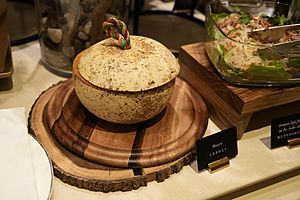Mimolette facts for kids
Quick facts for kids Mimolette |
|
|---|---|
 |
|
| Country of origin | France |
| Region, town | Nord, Lille |
| Source of milk | Cows |
| Pasteurized | Yes |
| Texture | Hard |
| Aging time | 2 months – 2 years |
| Named after | Lua error in Module:Wikidata at line 70: attempt to index field 'wikibase' (a nil value). |
Mimolette is a special kind of cheese that comes from the area around Lille, a city in France. People in France sometimes call it Boule de Lille, which means "Ball of Lille," because of where it's made. It's also known as vieux Hollande, or "old Holland," because it was first inspired by Edam cheese from the Netherlands.
Contents
What Is Mimolette Cheese Like?
Mimolette cheese is round, like a ball, and looks a bit like a cantaloupe melon. It usually weighs about 2 kilograms (which is about 4.5 pounds). This cheese is made from cow's milk.
Why Is Mimolette Orange?
The bright orange color of Mimolette comes from a natural ingredient called annatto. Annatto is often used to color foods. When just a little bit is added, it doesn't change the taste or smell of the cheese.
The Grey Rind and Its Helpers
The outside of older Mimolette cheese is grey. This grey color comes from tiny creatures called cheese mites. These mites are added to the surface of the cheese on purpose! They help to make the cheese taste even better as it gets older.
How Mimolette Tastes as It Ages
You can eat Mimolette at different ages. When it's younger, it tastes a bit like Parmesan cheese. Many people enjoy it most when it is "extra-old," which is called extra-vieille in French. At this stage, it can be quite firm to chew. The inside of the cheese then starts to taste like hazelnuts.
The History of Mimolette Cheese
Mimolette cheese was first made a long time ago, because King Louis XIV of France wanted it. He asked for a French cheese that could replace the popular Edam cheese from the Netherlands. This was part of a plan to help French products become more popular.
Making Mimolette Unique
To make Mimolette different from Edam, it was first colored with carrot juice. Later, they started using annatto to give it its special orange color. This made it stand out.
A President's Favorite Cheese
Mimolette cheese was known to be a favorite of a famous French leader, President Charles de Gaulle.
See also
 In Spanish: Mimolette para niños
In Spanish: Mimolette para niños
 | Aurelia Browder |
 | Nannie Helen Burroughs |
 | Michelle Alexander |

